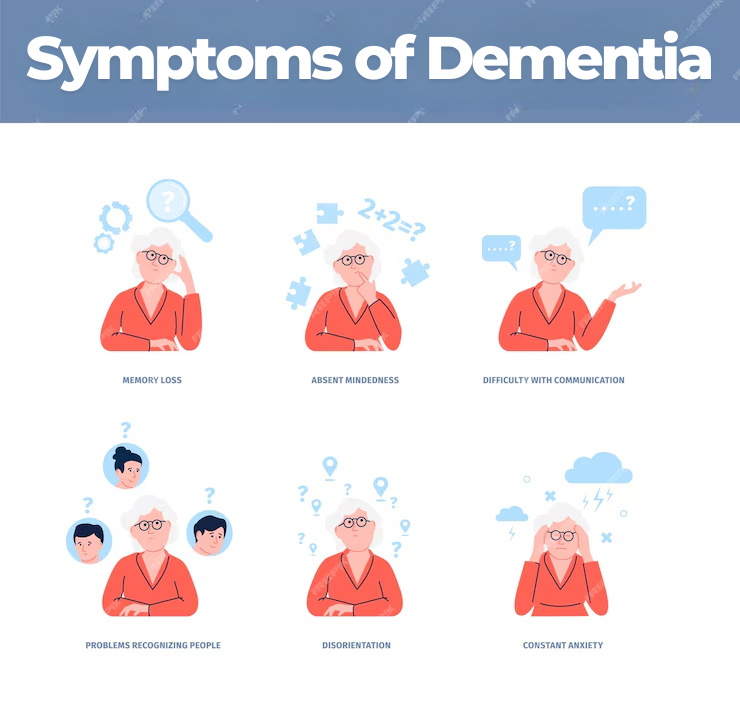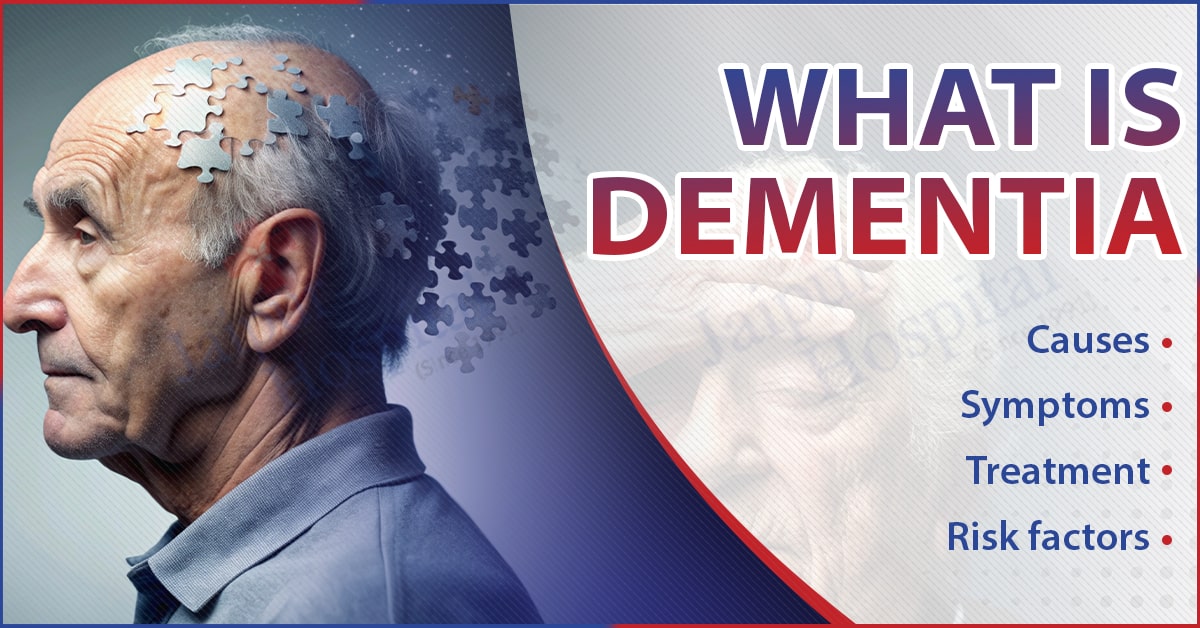Introduction
Dementia is a broad term that describes a decline in cognitive function that interferes with daily life, affecting memory, thinking, reasoning, and social abilities. It is not a single disease but rather a collection of symptoms cause of dementia by various underlying conditions, with Alzheimer’s disease being the most common cause. Dementia is generally observed in elderly individuals, though it is not an age-related disease. The present article explores the causes and symptoms of the condition, which trigger its development.
It will discuss the different forms of treatments and risk factors responsible for dementia development. It helps in diagnosing the patient earlier, as this will eventually provide better management of the disorder, and eventually, the quality of life will also be improved in those affected.
What is Dementia?
A progressive deterioration in cognitive abilities, such as memory, thinking, and problem-solving, brought on by neuronal loss or injury, is the hallmark of dementia. It is caused by brain illnesses, the most common of which is Alzheimer’s disease. According to biology, dementia is associated with neurodegeneration and the buildup of aberrant protein deposits (such as beta-amyloid plaques and tau tangles in Alzheimer’s disease), which disrupt synaptic transmission and cause brain atrophy.
Lewy body buildup, frontotemporal degeneration, and vascular injury are other reasons that impair neuronal networks and cognitive function.
Read Also: Orthopaedic Problems in Winter: Common Problems & Prevention Tips
Causes of Dementia
Dementia can arise from a variety of diseases and conditions that harm brain cells. Here are the main causes:
- Alzheimer’s Disease: This is the most prevalent cause, marked by the presence of beta-amyloid plaques and tau protein tangles, which result in neuronal death and a reduction in brain size.
- Vascular Dementia: This type occurs due to decreased blood flow to the brain, often from strokes, blood clots, or damaged blood vessels, which leads to the death of brain cells.
- Lewy Body Dementia (LBD): This condition is caused by abnormal accumulations of alpha-synuclein proteins (known as Lewy bodies) in the brain, impacting cognitive function, movement, and behavior.
- Frontotemporal Dementia (FTD): A kind of dementia resulting from degeneration of the frontal and temporal lobes; it is often linked to abnormal tau and TDP-43 protein buildup.
- Parkinson’s Disease Dementia: As Lewy bodies accumulate, this causes cognitive decline late into the disease course.
- Huntington’s Disease: A progressive genetic disorder that leads to the gradual and irreversible death of brain cells responsible for cognition, movement, and mental health.
- Chronic Traumatic Encephalopathy (CTE): Repeated head injuries are common in athletes and military personnel, leading eventually to neurodegeneration.
- Infections and autoimmune disorders: For example, HIV, syphilis, multiple sclerosis, and lupus all cause inflammation with resultant loss of cognitive function.
- Metabolic and endocrine disorders: Conditions such as deficiencies of thyroid hormones, vitamin B12, or prolonged hypoglycemia exert abnormal influence on the brain.
- Toxicity and substance abuse: Long-term exposure to different agents, such as progressing through alcohol, drugs, heavy metals, or poisons, can lead to impairment and dementia-like symptoms.
- Normal Pressure Hydrocephalus (NPH): Is a buildup of cerebrospinal fluid in the skull, resulting in pressure on the brain that leads to symptoms similar to those of dementia.
Symptoms of Dementia
Some of the patient’s symptoms may vary depending on the underlying cause but generally involve cognitive, psychological, and physical changes.
Cognitive Symptoms
- Memory loss: Forgets past happenings, conversations, or appointments.
- Difficulty solving problems: The patient is unable to plan or organize or handle complex tasks.
- Confusion and disorientation: Loses the sense of time, does not recognize locations, or gets confused even when reaching familiar places.

- Bad judgment: Impulsive decisions, improper risk assessment, and impulsive behavior.
- Language-related problems: Word-finding difficulties or repetition of phrases; inability to follow a conversation.
- Difficulty with abstract thinking: Difficulty understanding numbers, understanding finances, or logical reasoning.
Read Also: Rectal Cancer Causes, Symptoms and Treatment
Psychological and Behavioral Manifestations
- Changes in mood: Worsening anxiety, depression, or becoming irritable
- Personality changes: Withdrawal, increased aggression, or inappropriate social behavior.
- Hallucinations and delusions: “Seeing” or “hearing” things that are not there or believing false thoughts.
- Loss of initiative and activity: loss of interest in hobbies, social activities, or routine.
- Restlessness and agitation: Pacing, fidgeting, or repetitive activity
Physical and Motor Symptoms (Late stages)
- Poor gait and coordination: Contributing to an increased risk of falls when motor problems occur.
- Muscle stiffness and shaking: More common in Lewy body dementia and dementia associated with Parkinson’s.
- Sleep alterations: Insomnia, hypersomnia, or REM sleep behavior disorder.
Risk Factors of Dementia
Dementia risk factors are multifactorial, resulting from a mix of genetic, lifestyle, and environmental factors. Major risk factors include:
Risk Factors That Can’t Be Altered
- Age: The highest risk factor; the risk increases significantly after the age of 65.
- Genetics & Family History: The presence of mutations in genes such as APOE ε4, PSEN1, and PSEN2 raises the susceptibility to dementia.
- Gender: Women are more vulnerable, primarily due to their hormonal differences and longer lifespan.
- Down Syndrome: Associated with higher rates of developing an early age at onset for Alzheimer’s.
Lifestyle/Behavioral Risk Factors (Modifiable)
- Cardiovascular Disorders: Hypertension, hypercholesterolemia, and heart disease are associated with dementia.
- Diabetes: Poorly controlled diabetes causes inflammation in the brain and leads to vascular compromise.
- Head Trauma: Repeated trauma, as with repeated concussions with contact sports, may result in chronic traumatic encephalopathy.
- Social Isolation & Depression: Loneliness, as well as untreated mental health conditions, increase the risk of dementia.
- Chronic Stress & Poor Sleep: High cortisol levels and sleep disorders such as sleep apnea compromise the brain.
- Exposure to Environmental Toxins: Heavy metals like lead and mercury and air pollution may promote neurodegeneration.
Treatment and Management of Dementia
Dementia has no cure but treatments and management strategies may be used to delay its progression, alleviate symptoms, and enhance the quality of life.

Medications
- Cholinesterase inhibitors (Donepezil, Rivastigmine, Galantamine): They enhance memory and cognitive functions through an increase in acetylcholine.
- NMDA receptor antagonist (Memantine): Regulates glutamate activity that prevents damage to the brain cells, thereby improving cognitive functions.
- Antidepressants & Anti-anxiety drugs: Tend to stabilize mood disorders like depression and anxiety.
- Antipsychotics (reservations): Used in severe behavioral symptoms but with great caution due to side effects.
Lifestyle and Supportive Therapies
- Cognitive Stimulation Therapy (CST): Activities that challenge thinking and memory.
- Behavioral Therapy: Agitation, aggression, and hallucinations are reduced through structured interventions.
- Physical Activity: Regular exercise improves circulation, slows the rate of dementia, and improves mobility.
- Healthy Diet: A Mediterranean or DASH diet that is high in antioxidants, omega-3 fatty acids, and vitamins promotes brain health.
- Speech and Occupational Therapy: It helps with communication problems and adjustment of daily activities.
Assistive and Supportive Care
- Memory Aids: Use of notes, reminders, and smart devices to support daily living.
- Home Modifications: Safety adjustments, such as grab bars, proper lighting, and fall-proofing.
- Caregiver Support & Education: Education of caregivers on symptom management and stress management.
- Respite Care & Support Groups: Relief for caregivers and social interaction for patients.
New Therapies
- Immunotherapy & Anti-Amyloid Drugs: The New Alzheimer’s drugs Lecanemab that attack the amyloid plaques.
- Stem Cell Therapy & Neuroregeneration Research: How to regenerate damaged brain cells.
Preventing dementia: can it be avoided?
Although dementia cannot be prevented in its entirety, a brain-healthy lifestyle can significantly reduce the risk and delay its onset.
- Eat a Mediterranean or DASH diet rich in fruits, vegetables, whole grains, nuts, and fish.
- Limit processed foods, excess sugar, and unhealthy fats to reduce brain inflammation.
- Ensure adequate intake of vitamins B12, D, and omega-3 fatty acids, which support brain function.
- Regular exercise, including at least 150 minutes of moderate activity, such as brisk walking, swimming, or cycling, per week.
- Strength training and balance exercises may enhance mobility and reduce fall-related injury.
- Mental activities such as puzzles, reading, learning new skills, or playing musical instruments
- Social activities, such as joining clubs or participating in group discussions, can help maintain cognitive function.
- Maintain blood pressure, cholesterol, and blood sugar levels to prevent vascular damage.
- Smoking and excessive alcohol can lead to dementia, as the substances harm brain cells.
- For proper consolidation and detoxification in the brain, ensure at least 7-9 hours of sleep each night.
- Address possible sleep disorders that can also influence cognitive impairment like apnea.
- Practice relaxation activities such as meditation, yoga, or deep breathing exercises.
- Mental disorders that are said to be precursors to a chance of having a dementia episode must be addressed including depression and anxiety disorders.
- Wear helmets while cycling or playing to avoid head injuries. Prevent falls, and make sure older adults’ homes are safe.
Conclusion
Dementia is a degenerative condition that affects the cognitive functions of life and mental health. It cannot be cured; however, constant management is employed to slow the progression and maintain quality of life, especially when diagnosed at the early stages. Prevention of dementia and other neuro-degenerative diseases can be achieved through maintaining a healthy lifestyle, mental exercise, and proper medical care and medication. It’s part of both Neurology and Geriatric specializations where intensive diagnosis and treatment are carried out.
Some of the renowned hospitals like Jaipur Hospital offer advanced diagnosis and treat dementia with appropriate treatments by expert neurologists and ensure the most support-based assistance possible in the patient’s best interest.


